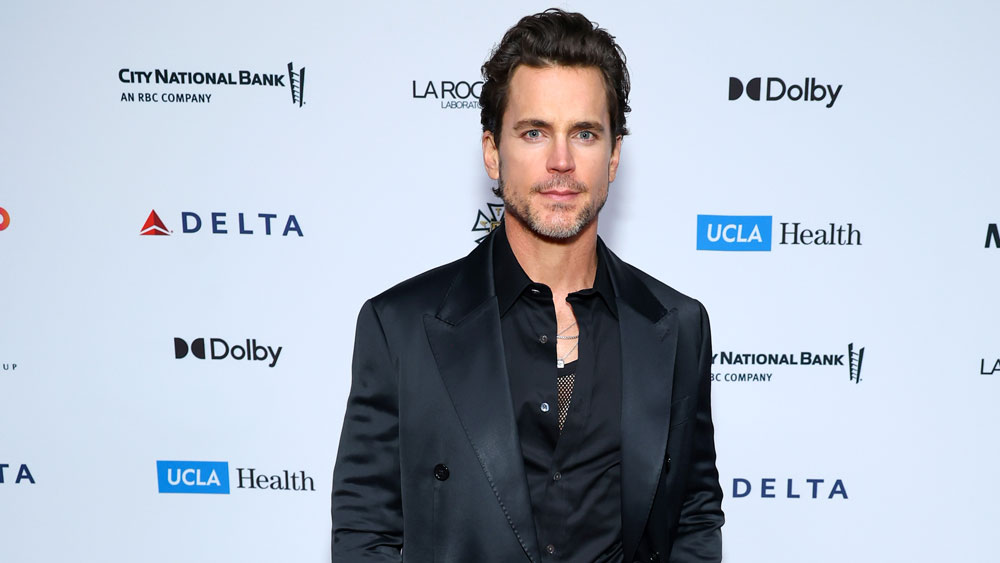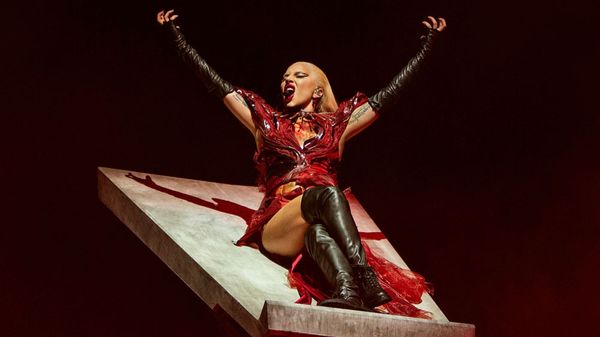April 12, 2014
Re-Booting the Past :: Kristen Kathryn Rusch on Writing, and Re-Writing, History
Kilian Melloy READ TIME: 15 MIN.
Kristine Kathryn Rusch writes books. Lots of books, in lots of genres, sometimes under pen names. She wins lots of awards for those books. If you're a fan or sci-fi, fantasy, mystery, or romance, chances are you've read at least some of her work. She also edits, teaches at writers' workshops, and blogs: Young writers could do a heckuva lot worse than to check out her blog "The Business Rusch," which tackles subjects like marketing one's work, defending one's artistic and legal rights, writerly sidelines -- those writers workshops, for instance -- and the care and feeding of one's Muse.
This reporter has read a fair amount of Rusch's oeuvre, and conducted more than a few interviews with her in the past. (As a matter of full disclosure, I have to acknowledge that I dedicated a short story to Rusch earlier this year -- inspired, no less, by Rusch's own "Free Fiction Mondays," in which the author posts her own short fiction, free of charge, for the enjoyment of all. Rusch publicized my story in a reading list newsletter. It made for a moment of astonishment at a friend's thoughtful kindness, not to mention fanboy bliss.)
The past few months saw the publication of two books by Rusch with a remarkable synchronicity in that both novels are set in the past -- one in the mid-1960s, and one at the very start of the 1970s. Both books belong to a series; Rusch is a proven writer of entire literary franchises, from the hardboiled "Retrieval Artist" books to the star-faring "Diving Universe" adventures, to the quirky and fantastical novels of "The Fey" series.
But these new novels are not science fiction or fantasy -- not in the usual sense, anyway. "Street Justice" (WMG Publishing, March 12, 2014), written under Rusch's nom de plume Kris Nelscott, is the seventh installment in the adventures of Smokey Dalton, an African-American private eye operating during the turbulence and social upheaval of the sixties. (Or rather, the seventies, as of this newest book.) "The Enemy Within" (WMG Publishing, April 9, 2014), a full novel treatment of Rusch's celebrated story "G-Men," tackles the world just after JFK's assassination -- and posits the killing, only months later, of FBI head honcho, political power player, and closeted homosexual J. Edgar Hoover.
In both cases, prejudice looms large; it's racial in the first case, and based on sexual orientation in the second, but in both cases there are also open-minded people who see past the limitations of bias. An even more intriguing aspect of the books is how, in the case of "Street Justice," the story unfolds against authentic historical events (appalling, by today's standards) while in the case of "The Enemy Within" Rusch creates a parallel universe that re-imagines history rather than re-constructing it.
Future histories and fantasy worlds can be difficult to create well: They must be populated with dimensional, believable people who operate from comprehensible motives. Those people also have to live in environments (geological, meteorological, social) that inform and propel their actions, and respond appropriately to those actions. Historical novels that use actual events, dates, people, and places as their backdrop (and sometimes as part of their stories) rely on solid research as much as on the hard workout to the imagination that comes with world-building from scratch. But the genre of the alternative history must be the most challenging of all, selecting a pivotal moment in history as we know it and proceeding from there, if it's to be successful, into a "photo-real" world, one that's as highly detailed and logical in construction and consequence as the real world.
Rusch has proven many times over that she's a gifted world-builder, whether the world is the highly dangerous, racist America of 1970 (ripped from the real pages of archival newspapers), or a far future in which people not only live on the Moon, but negotiate professional lives with any number of alien species at the risk of running afoul of unknown or poorly-understood extraterrestrial legal systems (a central motif in the "Retrieval Artist" books). Still another first installment in a promising series, "Snipers," follows the exploits of two characters, a writer and a musician, as they explore the temporal intricacies of a universe already changed by a time-traveling assassin. (That series has the added appeal of being set in a truly strange alternate universe... named, Europe!)
But whatever the setting, from the reaches of space centuries hence to Chicago of forty-some years ago, Rusch never fails to demonstrate a masterful understanding of the most mysterious of all natural phenomena: The human animal.
EDGE undertook to explore the themes and resonances that tie together, and set apart, these two new novels in a recent chat with Kristine Kathryn Rusch.
EDGE: Setting a story in the past, as oppose to the far future, must take enormous research because you can make up future history to a large extent, but you can't simply make up real history.
Kristen Kathryn Rusch: It does take a lot of research, but I read history as a hobby and I love tracking everything down. I was a journalist for years, and I majored in history, so primary research and digging out tiny details is something I do easily. I love digging through old newspapers, and books of the time period. It's amazing what you find.
For example, in old newspapers, the ads tell me as much (or more!) than a news story does. I know how much groceries cost and what furniture is current. I always keep copies of what's on television (for Smokey) or what was going on in sports. The most important thing for the Smokey series has turned out to be the weather reports. I know Chicago intimately, and the city varies from season to season. So knowing what the weather was like tells me what the city was like.
Two other things make my life easier now. First, so many archives are available on the internet (often with the help of my local library). And second, photographs of the time and era are very important because they give me details I would otherwise miss -- such as the ashtrays mounted to the wall by the elevator in a Chicago hospital circa 1969. I had forgotten that smoking used to be allowed in hospitals, except on the floors where people were on oxygen! And it was so common, I doubt many books from the time mentioned it.
EDGE: You can't make up past history, that is, unless you are writing an Alternate History! That's what you're doing in "The Enemy Within." If having to research the past as it happened is an enormous undertaking, how much more do you have to read, watch, and ponder to create a viable alternate history -- something that proceeds logically from the political and social context of the times as well as the historical figures involved?
Kristen Kathryn Rusch: Well, you can't wing it, unfortunately. The extrapolation is pretty easy for me at the start, and then I have to build it, story by story or book by book, as I go along. Writing an alternate history requires as much research as a regular historical novel, because all the information up to and past the turning point has to be accurate.
Even if you're writing steampunk (which is, really, alternate history), you need to think long and hard about what the changes would mean to the existing society and how that fantastic element would change the society.
EDGE: Many alternate history stories focus on the "What if JFK had survived the assassination attempt at Dealy Plaza?" Why is that such a point of fascination for writers?
Kristen Kathryn Rusch: There are turning points in history, just like there are in life, and they're truly abrupt. An assassin almost took out Franklin Delano Roosevelt in February of 1933, when he was president elect. Imagine the history of the Depression and of World War II without Roosevelt. It's hard, isn't it?
I was raised on what was once called The Great Man version of history. Now, we call it the Great Person version of history, but it remains the same. When I was an undergraduate, that theory was in disrepute. Historians substituted a movement version of history. Movements are important, but they're only as good as their leaders or their visionaries. And now, it's pretty clear to those who study that certain events happened because of the people involved and certain events happen because of human movements and certain events happen -- like Hurricane Katrina. They all have an impact on what happens next. And that just fascinates me.
EDGE: You chose to focus not on Kennedy's assassination, but on Hoover's, in the wake of Kennedy. What informed that choice? Why Hoover?
Kristen Kathryn Rusch: A time crunch informed the choice. I'm not going to write what everyone else has written -- and JFK's survival has been done to death (if you'll pardon the pun). But Lou Anders invited me into an anthology called "Sideways in Crime," which was alternate history mystery, and I didn't have the time to write the kind of story I wanted.
I was actually going to bow out. I told my husband Dean Wesley Smith that at lunch, because I had only 3 days left to write the thing, and he asked me what I could wing. I was writing the Kris Nelscott books at the time (which was why I had no time), and I said, "Nothing. You can't wing this kind of story."
So he clarified -- what could I do that would require little or no research because I'd already done the research? Then he suggested killing Hoover in 1968, that horrid year of assassinations.
I said, "It would make no difference if Hoover died in 1968. However, if he died in 1964..." And instantly, I knew. I had a story, I knew what would be different, and I can see the impact. (Yes, I haven't gotten to all of it.)
Turns out the no research thing was wrong. I still had to cram a ton of research in and I had to listen over and over again to audio of Lyndon Baines Johnson and Robert Fitzgerald Kennedy to capture their voices. But I had the research materials in hand, and had casually read a lot of it already. So I was prepared in that way.
The story was picked up by two different year's bests -- one in mystery and one in SF. That was the first time anyone had ever achieved that. I was pretty stunned.
EDGE: Last November marked the 50th anniversary of JKF's killing. Was that milestone a factor in deciding to take G-Men and turn it into a novel?
Kristen Kathryn Rusch: It was always meant to be a novel. I wrote it right after the story came out and every traditional publishing house I approached turned it down. It wasn't SF enough for the SF houses, and the mystery people had no idea what to do with it. They couldn't market it.
So when WMG came along, I asked them if they wanted it, and oh, boy, did they.
EDGE: Though JFK's killing is not the focus here, it does exert a major influence over the story and the characters, and you do touch on a number of inconsistencies that have never been resolved in the 50 years since Kennedy was murdered. Given all the high-tech forensic analysis that's been done on the Zapruder film and at least one audiotape of the event, is there still reason in 2014 to believe that Oswald was not a lone gunman after all... or even to suspect that Oswald didn't pull a trigger, but was only a patsy?
Kristen Kathryn Rusch: Let's see, I'm answering this in April of 2014. Today, I'll tell you that he was a patsy. If you'd asked me last fall, while I was reading a different series of books for another project, I'd've told you he was a lone gunman. By the way, I think Stephen King wrote the definitive novel on this in "11/22/63." No one's going to do that topic better.
EDGE: This novel has all the makings of being the first installment in a whole new series... It's amazing how many series you are able to generate and sustain: The Diving Universe, The Retrieval Artist, the Smoky Dalton mystery series, and (I have a strong suspicion) also a new series building from the events in last year's time-travel (and alternate history) novel "Snipers." How do you do it -- and does it get to be overwhelming?
Kristen Kathryn Rusch: Yeah, it's the first book in a series. But it does stand alone. I have two other unpublished series that I'm not going to publish a book in until I have another written. This series, I knew I had to get to the next book so I didn't need the impetus. I've got it all lined out.
Just like I do for "Snipers." I'm hoping to get to Munich to do some research for that, but I'm not sure when/if that'll happen in a timely fashion, so I'm stalling a bit.
How do I do it? I have a hummingbird brain. It flits around and touches on too many things. If I land on something too long, I get bored.
Right now, I'm writing five books in the "Retrieval Artist" series all at once. They're one big story, and the thing I'm fighting the hardest is my hummingbird brain. I want to write a bit then move to something else, and I can't. I need to keep that story arc in my head. It is truly driving me crazy.
EDGE: Do you conceptualize your storytelling in terms of multiple novels? It certainly allows for a broader and deeper field to play in than any single book would.
Kristen Kathryn Rusch: I've always done that. Some books are a one-off. Some short stories are too. But many of my short stories are merely an exploration of a novel to come. To me, a story is a story is a story and it gets to choose its own length.
EDGE: Let's talk "Street Justice," which is part of your Smoky Dalton series, which has previously dealt with other historical events such as the assassination of Martin Luther King, Jr. First off, this series is told in the first person by an African American man -- is that a difficult perspective to achieve and maintain? What led to the decision to adopt this perspective for the series?
Kristen Kathryn Rusch: Let me answer the first person question first. No, it wasn't hard. People are people are people. I get this question often, especially at talks, and it always surprises me.
I came out of science fiction, and no one ever asks me if it's hard to write from the point of view of someone from a different gender, or from someone who lives in the future, or from the point of view of an alien. But people ask me about Smokey all the time. Back when the first book came out, some people would pull me aside and ask in a whisper, as if we were discussing something shameful.
How did Smokey come about? From an essay called "Look Away, Dixie Land" by Patricia Storace, reprinted in "The Best American Essays 1992." In that essay, Storace mentions that as a 10-year-old boy, Martin Luther King attended the "Gone With the Wind" premiere in Atlanta, dressed as a slave child (rudely called a pickaninny), along with the choir from his church, directed by his father.
I realized the Old South met the New South that day, and that it would do so again in April of 1968 when King was assassinated. Smokey came to me full-blown then, as a friend of King's, also dressed like a slave child at that weird Atlanta event, and Smokey would be there when King died.
I never questioned the point of view or whether or not I could write it. I believe we're all the same under the skin. All I needed to do was enough research to capture the voice. I gave the book, "A Dangerous Road," to some friends to read, friends who grew up in the Civil Rights Movement, to see how I did on historical authenticity.
Smokey's race -- and my race -- only became an issue when I tried to get the book published, a story I've retold on my business blog.
Smokey is very real to me, as is Miles Flint from the "Retrieval Artist" series, as are all of my characters.
What no one notices about my science fiction is that most of my characters are people of color. I just have this "Star Trek" view of the universe -- that the problems of racism will be long solved by the time of my SF tales. In fact, Miles Flint is unusual because he's blond and blue-eyed. He's a throwback, a pale-skinned man in a world where almost no one is white. It's mentioned in the stories, but it's not a focus of them -- so I "got away" with it in traditional publishing. (My friends who made an issue of race rarely did.)
EDGE: All these years after the triumphs of the civil rights era, and with comparable triumphs taking place today for GLBT people, how is it we're still so far off from adopting a universal "Star Trek" view of humanity?
Kristine Kathryn Rusch: I think we as humans always find something/someone to discriminate against. Someone who is not in the tribe, however the tribe is defined.
In the "Retrieval Artist," that's clones and aliens, not people with different religions, ethnicity, or sexual preferences. I do think it's part of any mammal - look at cats, which are very pride-oriented - or dogs, pack-oriented. Humans just take it to an extreme. So in my way, I deal with prejudice in most of what I do, just in different ways.
EDGE: The Smoky Dalton books are set in "real" history, so I'm not expecting we'll see any major shifts from accepted textbook accounts (if MLK's killer is brought to justice it won't be in a broadly public manner, for example). But "Street Justice" is a hard-hitting story in its own right -- perhaps a little controversial, since, as the title implies, there's a certain amount of extra-judicial activity going on. Was (is?) this sort of "street justice" a necessity in neighborhoods where the police won't venture?
Kristen Kathryn Rusch: Unfortunately, yes. I say unfortunately, because the police were no help in these neighborhoods and were often part of the problem. Even in Chicago, which has had African Americans on the police force longer than most American cities. At first the African American police officers had little power, and later, they gained some power, but that didn't help in the very racist court system.
The stuff that happened to Bobby Seale in what was the Chicago 8 trial (and became the Chicago 7 when he was moved to a different jurisdiction) is so shocking that I couldn't figure out how to put it in the series.
EDGE: Interpersonal relationships are an important part of all your novels, but it seems as though there's an extra emphasis on family, friends, and social connectivity in "Street Justice." Is this part of the subtext of the Smoky Dalton novels -- an object lesson in how people on the margins have to rely on one another?
Kristen Kathryn Rusch: One of the hidden histories of the United States happened in the middle-class and upper-class African American cities and communities. They built their own network of lawyers, churches, insurance agencies, funeral homes, and so on. There were also people like Smokey who could actually handle some of the judicial issues the so-called real government couldn't. It was very dangerous work.
The networks were -- and are -- so important. The community has to band together because it has no outside help.
EDGE: This would be a fair question for any of the series you write, but with Smoky Dalton in particular I wonder if you have a target year or target event in mind to tie up the threads and resolve the ongoing plot points -- a sort of series finale? And... what major events appeal to you as necessary and creatively inspiring points to visit along the way? (In "Street Justice" there was a moving and shocking reference to a police execution of members of the Black Panther party, which certainly helped set the mood and paint in the nuances of what Smoky and his family are facing in Chicago in 1970.)
Kristen Kathryn Rusch: I do have two future novels in mind. One happens around the Church Committee hearings that occurred in 1975 and 1976, and another happens in the mid-1980s. I'm afraid of the 1980s one. It'll piss off fans, so maybe I'll do what John D. MacDonald was rumored to have done (but didn't) with Travis McGee. I'll write that book and leave instructions to have it published after I die.
Kilian Melloy serves as EDGE Media Network's Associate Arts Editor and Staff Contributor. His professional memberships include the National Lesbian & Gay Journalists Association, the Boston Online Film Critics Association, The Gay and Lesbian Entertainment Critics Association, and the Boston Theater Critics Association's Elliot Norton Awards Committee.





